
Renewable energy auction secures enough power for 11m UK homes


Having good chance of limiting global heating to 1.5C is gone, sending ‘dire’ message about the adequacy of climate action
The carbon budget remaining to limit the climate crisis to 1.5C of global heating is now “tiny”, according to an analysis, sending a “dire” message about the adequacy of climate action.
The carbon budget is the maximum amount of carbon emissions that can be released while restricting global temperature rise to the limits of the Paris agreement. The new figure is half the size of the budget estimated in 2020 and would be exhausted in six years at current levels of emissions.
READ: https://www.theguardian.com/environment/2023/oct/30/climate-crisis-carbon-emissions-budget
Changing seasons |
|
The timing of spring in the Arctic has become more and more erratic in the past 25 years, leading to growing discrepancies between the behaviour of animals and plants and the conditions they depend on. Since 1996, Niels Schmidt at Aarhus University in Denmark and his colleagues have been monitoring the ecosystem at Zackenberg, a mountain in north-east Greenland. When they analysed the first 10 years of data, they found that spring was arriving around two weeks earlier in 2005 compared with 1996. But now that trend has been replaced by extreme variability from year to year, with animals and flowers emerging at different times. |
The world’s green energy transition, which is essential to achieving net-zero emissions and halting climate change, is under threat, as a financial era of rising interest rates has made some projects, like new offshore wind farms, unaffordable.
Estimates suggest that Europe must now find an additional €163 billion to reach net-zero by 2050, with figures likely to be similar elsewhere in the world. As such, firms are pulling back from new projects.
Last week, Swedish energy firm Vattenfall announced it would stop work on an offshore wind farm in the UK’s North Sea, warning development costs for the Norfolk Boreas scheme had increased by 40 per cent due to rising interest rates and supply chain costs.

Rising interest rates have made the green energy transition more expensive.
Voters want climate action but don’t trust politicians to do it. Could projects like a Whitehaven windfarm be the answer?
The seaside town of Whitehaven, in the north-west of England, found itself at the centre of a political storm in May, when the levelling up, housing and communities secretary, Michael Gove, gave his approval for the UK’s first new deep coal mine in more than 40 years just outside the town.
But Whitehaven may soon be known for more than climate-wrecking coal. That is the ambition of Project Collette, a £3bn proposal for a windfarm off the Cumbrian coast to be part-owned by the local community – instigated by the Green Finance Community Hub in collaboration with the engineering firm Arup and community energy specialists Energy4All – and with the potential to power nearby industry.
If Cumbrians could stand on the sandstone cliffs and look out at wind turbines they owned, and that had provided jobs for local people, that might just build the political support and engagement that is so vital to reaching our climate targets?
READ
Measure, plan and make carbon reductions across your organisation
Are you measuring your organisation’s greenhouse gas emissions yet? We’re here to help if you’re ready to start.

Sustainability strategy
IPPC chair Hoesung Lee says over-reliance on the technology could mean the world misses 1.5C target
Over-reliance on carbon capture and storage technology could lead the world to surpass climate tipping points, the head of the world’s climate science authority has warned.
Hoesung Lee, chair of the Intergovernmental Panel on Climate Change, said using technologies that capture carbon dioxide or remove it from the atmosphere was “no free lunch” and that countries should be wary.
Lee noted that the IPCC had found it was likely that global temperatures could rise by more than 1.5C above pre-industrial levels, but could then be made to return to below 1.5C by the end of the century. “The jargon for that is the overshoot,” he said. “Carbon dioxide removal methods will be much in demand if that overshoot indeed occurs.”
“But there will be a cost to doing that. There’s no free lunch. And that cost includes that the longer the period of overshoot, there will be additional global warming, and there will be consequences of increased warming.
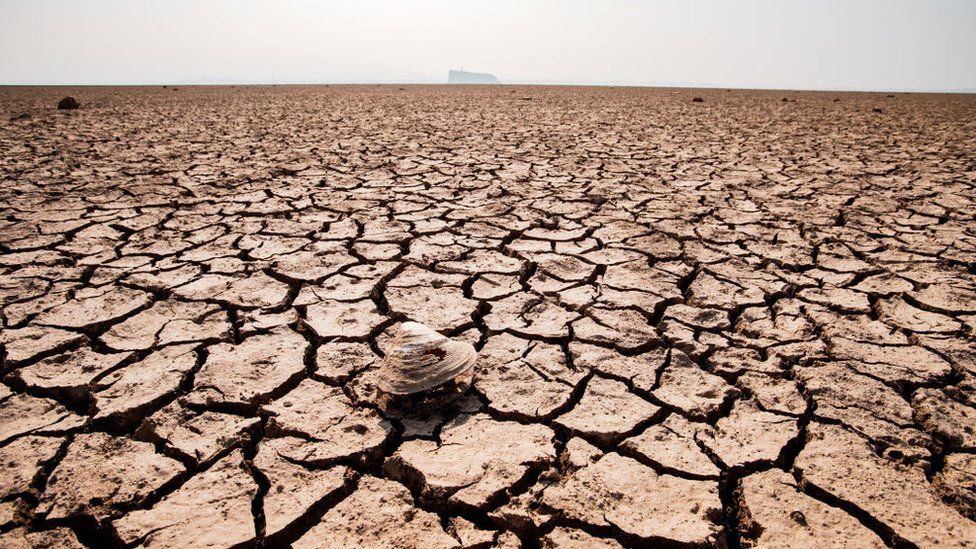
Predictions suggest it will be the 10th year in a row the global temperature is at least 1C above average.
The Met Office explained that a cooling effect known as La Niña will likely end after being in place for three years – part of a natural weather cycle.
It also noted the warming impact of human-induced climate change.
Scientific evidence shows that climate change is driving up the global temperature.
Company behind Devon venture hopes it will become a blueprint for projects owned by consumers
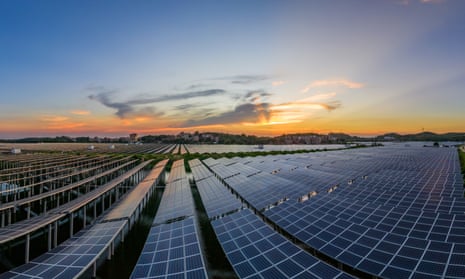
A solar power plant.
A ‘shared’ solar park is an option for households who cannot afford solar panels
or who do not own their home. Photograph: Fuyu Liu/Shutterstock
If you would love to have solar panels but don’t own your home or can’t afford the outlay, how about investing in Britain’s first “shared” solar park that is promising cheaper, zero-carbon electricity, direct to your energy bills for the next 40 years?
With two successful community energy schemes already behind it, Ripple Energy is looking for investors for its third: the construction of a 42MW solar park in Derril Water in Devon, not far from the Cornish town of Bude.
Once up and running in the summer of 2024, the project, which is being built by one of the world’s largest independent renewable energy companies, RES, will produce enough electricity to power 14,000 homes across Britain.

Restoring the populations of a few important groups of animals could help capture huge amounts of carbon from the air and thereby play a role in limiting global warming.
Climate change research has emphasised the importance of vast forests and seagrass meadows as the most efficient way of storing carbon. But bison, elephants, whales, sharks and other massive wild animals also store carbon in their bodies while promoting tree and seagrass growth, preventing carbon-releasing wildfires and packing down ice and soil to keep carbon in the ground, says Oswald Schmitz at Yale University.
“There’s been scepticism in the scientific community that animals matter, because if you just do the accounting, they’d say animals don’t make up much of the carbon on the planet, so they can’t be important,” he says. “What we’re doing is connecting the dots, showing that animals – despite their lack of abundance – have an outsized role, because of the multiplier effects that they create.”
To keep the average global temperature from rising more than 1.5°C above its pre-industrial level, scientists estimate that we need to remove 6.5 gigatonnes of carbon dioxide per year from the atmosphere until 2100. Current models that focus on protecting and restoring forest, wetland, coastal and grassland ecosystems would fall short by an estimated 0.5 to 1.5 gigatonnes per year, says Schmitz.
He and his colleagues reviewed data from previous publications about the environmental effects – including dispersing seeds, trampling, carbon cycling, feeding behaviour, hunting behaviour and methane production – of dozens of kinds of wild animals.
Analysis of internal climate projections shows Exxon scientists knew the harm of burning fossil fuels, while firm’s executives played down the risk
Exxon scientists accurately predicted the pace and scale of climate change more than 40 years ago, according to a study that its authors say adds weight to claims the oil firm knew about and sought to downplay the risks posed by continued fossil fuel use.
Scientists working for Exxon between 1977 and 2003 accurately forecasted the rate at which global average temperatures would rise as a result of carbon emissions, correctly predicted that human-caused global warming would first be detectable by around 2000 and reasonably estimated how much carbon dioxide would lead to dangerous warming, according to the study.
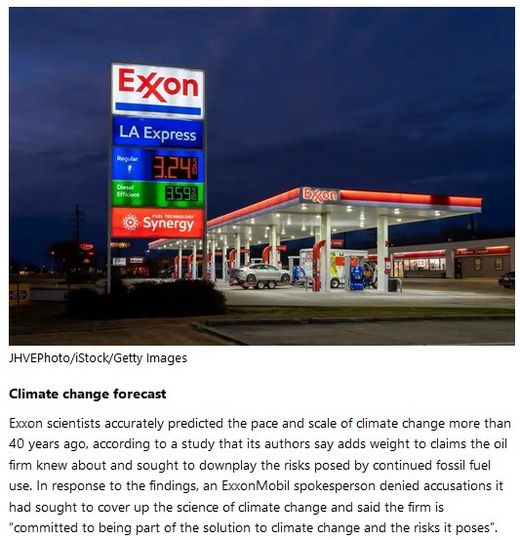
This firm is committed to advising clients on better outcomes for the planet. As an example, 20% of funds that we advise on are alternative energy investments.
Our clients, with millions invested in clean energy, are making a real contribution.
Some other funds we support:
– Developing better engineering solutions, such as medical devices and prosthetic limbs.
– Technology that saves energy by stopping the cold escaping from freezer cabinets in supermarkets. Software solutions to manage risk.
– Financing childcare facilities, GP practices ambulances and better care homes.
Britain claims to be at the forefront of the fight against climate change and our scientists and engineers are trusted to provide solutions; your savings and pension pots can make a difference for your children and grandchildren.
Alternative Energy – facts.
The sector offers a range of funds to either provide capital growth, by investing in new developments, windfarms, solar, hydro, anaerobic digestion. Or income generated by buying into long term income contracts, usually 30 years.
Examples of Alternate Energy investments;
One provides money to build has returned 84.17% since its launch in June 2019
The other is an income fund gaining profit from long term energy contracts and returned 101,92% since December 2017.
NOTE: These are no guarantee of future returns
Coal and gas generation is increasing in cost
whilst solar is substantially cheaper.
The economic argument for solar is strong.

Green home upgrades could also create 140,000 new jobs by 2030, analysis by Cambridge Econometric finds
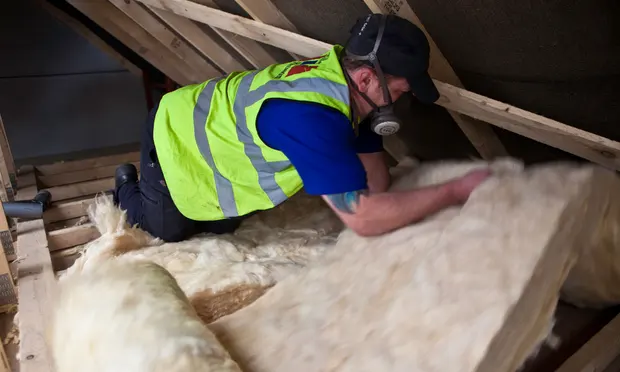
Insulating homes in Britain and installing heat pumps could benefit the economy by £7bn a year and create 140,000 new jobs by 2030, research has found.
But the uptake of these energy-saving measures depends heavily on government policy, according to analysis by Cambridge Econometrics, commissioned by Greenpeace.
Read more … https://www.theguardian.com/environment/2022/sep/20/energy-saving-measures-could-boost-uk-economy-by-7bn-a-year-study-says
Amazon ecosystem is on verge of collapse, leaders tell brands such as Apple and Tesla as UN gathers in New York
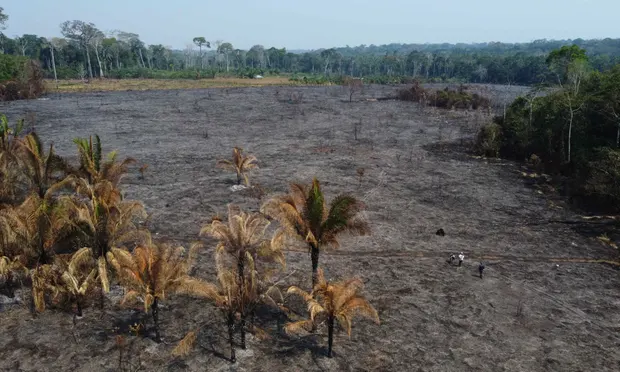
Indigenous leaders from the Amazon have implored major western brands and banks to stop supporting the ongoing destruction of the vital rainforest through mining, oil drilling and logging, warning that the ecosystem is on the brink of a disastrous collapse.
Representatives of Indigenous peoples from across the Amazon region have descended upon New York this week to press governments and businesses, gathered in the city for climate and United Nations gatherings, to stem the flow of finance to activities that are polluting and deforesting large areas of the rainforest.
Efforts to make flying greener mostly count carbon dioxide emissions only, but modelling shows this ignores 90 per cent of future flights’ contribution to climate change

Future flights will endanger the goals of the Paris climate agreement if efforts to achieve net-zero aviation fail to account for the warming effect of streaks of clouds created by planes, a study has found.
The research comes just days after the UK government announced its Jet Zero Strategy on 19 July, with a target of reducing carbon emissions from flights to net zero by 2050.
Nicoletta Brazzola at ETH Zurich in Switzerland and her colleagues found that even if such efforts to reduce carbon emissions succeed, the aviation sector worldwide could increase global average temperatures by between 0.1°C and 0.4°C. Because the world has already warmed 1.1°C since the industrial revolution, Brazzola ’s team says the extra warming could compromise the Paris deal’s aim of holding temperature rises to 1.5°C.
The warming comes from the ways flights heat the atmosphere beyond the carbon dioxide emitted by burning jet fuel, which are the only emissions currently counted by international and most national efforts to decarbonise aviation. The main one of these non-CO2 effects is the contrails that form because of the soot, aerosols and water vapour released by aircraft engines.
“We found the mitigation efforts needed to get aviation to a place where it’s compatible with the Paris agreement are enormous,” says Brazzola.